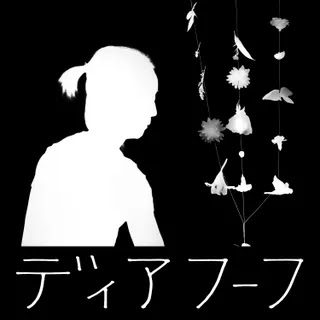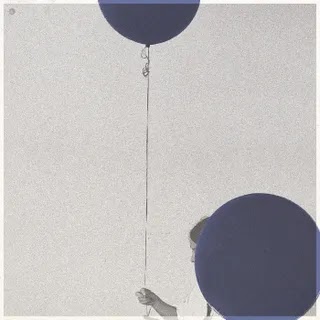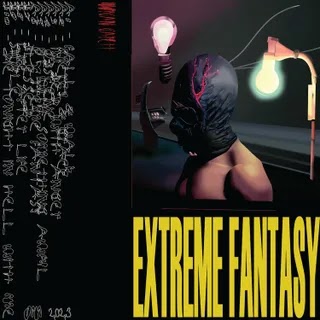After 2018’s prickly IRISIRI, the Queens experimental musician narrates a personal and artistic rebirth in spare songwriting fleshed out with acoustic guitar, strings, and turbulent sound collages.
The most jarring moment of Eartheater’s fifth album comes during “Volcano,” a sunken lament for misguided love. Alexandra Drewchin’s voice—her most versatile resource, often pushed to ethereal or guttural extremes—cuts through to declare: “I’m obsessed with this grain of salt/I’m fixated on a grain of sand.” With her voice unaffected, grounded in the alto section of her three-octave range, Drewchin, who often appears otherworldly in her music, almost sounds like a woman you might know. Firmly bound to themes of renewal and rebirth, Phoenix: Flames Are Dew Upon My Skin is a winning experiment in economy and earthiness from an artist previously known for ornament and excess.
The Queens-based artist’s first two albums were a snug fit on freaky electronics label Hausu Mountain. In 2015, both Metalepsis and RIP Chrysalis emerged out of enchanted thickets of wyrd folk, fingerpicked guitar, softly throbbing synths, and Drewchin’s infinite cast of voices, from sighing banshee to vocal-fried mumble rapper. Coupled with an alluring backstory—a home-schooled musical prodigy raised on a horse farm, now ensconced in New York’s avant-garde art and dance scene—the whole package appeared sprinkled with psychoactive fairy dust. That version of Eartheater might have ended up making cerebral sideways pop for a label like 4AD or Sacred Bones, but three years later she joined Berlin’s PAN for the cold and prickly IRISIRI, a dissociative mix of techno, cloud rap, illbient beats, operatic wails, and post-Young Thug ad libs. In 2019 she strayed even further from the sylvan path as techno producers including New York’s AceMo pumped a dark electronic pulse through the self-released mixtape Trinity.
Each of those records extended Drewchin’s cinematic universe, her voice embodying an ever multiplying dramatis personae, her jump-cut arrangements catering to her infinite influences—a strategy that occasionally collapsed under its own ambition. On Phoenix, though, Drewchin forces the rainbow back in the prism, concentrating her vast range of identities and impulses into a unified beam. The songwriting is sharp and spare, and her lyrics are easier to decipher, less tangled in delirious wordplay. Acoustic guitar returns to the fore, sometimes fingerpicked in ripples, like an old Leonard Cohen ballad. Simple chord progressions are gilded by celestial strings from Spanish conservatory group Ensemble De Cámara, and harp and violin from Marilu Donovan and Adam Markiewicz of New York duo LEYA.
Some of the material was recorded last year for a theatrical collaboration with Brighton duo Semiconductor, whose audiovisual spectacle included stop-motion images of luminous crystals. Drewchin soundtracked the clips with shivering strings, heavy-metal bass blasts, the ching of an ice pick, and swings squeaking in the park; these turbulent sound collages act as interludes between the vocal-led songs on the album. The album itself came together during a 10-week stint at FUGA, an artist residency program in Zaragoza, Spain. The region’s rugged terrain finds its way into the strata of songs like “Volcano” and the logorrheic “Diamond in the Bedrock,” where Drewchin’s dense poetry is interrupted by Migos-ian syncopation (“Cut through the graves/Cut through the graves”), a technique she also employed on IRISIRI. But for the most part she eschews the proggy density of her earlier records in order to dig down to her core, open to whatever strange truths might be uncovered. “The meaning hasn’t come up yet,” she squeaks on “Below The Clavicle” over swelling strings; “it’s still under the surface.”
The phoenix is an ancient and familiar symbol of rebirth, a mythical creature born out of its own destruction. Drewchin adopts her new avatar with enthusiasm: She gets into character on the album’s sleeve with bony wings sprouting from her back and golden sparks shooting up to her ass cheeks—half thirst trap, half LARPer fantasy. The album’s opening lines, repeated on the final track, illuminate the theme: “The only way out of this is through/Cross my heart and hope to die beyond hope/I’ve seen the phoenix rise out of my ashes.”
What turmoil has spurred this renewal? Drewchin’s last few years have been dramatic: on top of the albums, tours, and commissions there’s been stolen gear, a hard drive failure, and the end of a long relationship. Moving on from the past is standard stuff for an album concept, but in her telling it sounds like she has cut the cord in order to commit herself totally to her art, happily self-partnered with her interior alter egos. Several songs seem to take place during a final tryst: “You and I don’t need to be more than just right now/But just right now could steal a lifetime/So I’m inclined to break away,” she warns. When she “falls into bed with you again” on “Fantasy Collision,” she likens the experience to a car crash–ouch–before “rising from the wreckage.”
Drewchin recently admitted to The Face that she thinks the album “teeters on corny,” acknowledging that getting too close to those delicate heartstrings tends to turn off the chin-stroking set: too simple, too emotional, too feminine, eww. But, she added, “I do also think that corny is adjacent to iconic.” The oldest, most elemental myths are often the most powerful, and the force of Phoenix, like its fiery namesake, stems from its simplicity.
















0 comments:
Post a Comment